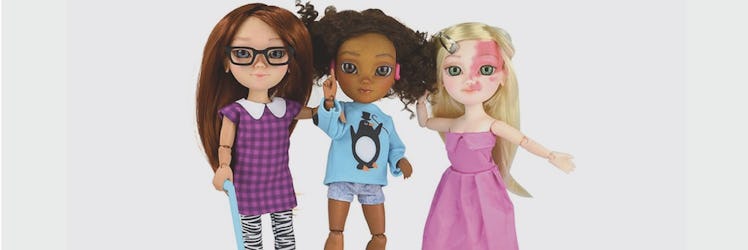The Best Realistic & Positive Body Image Dolls For Kids
These dolls rep the disabled, ethnically diverse, and — gasp — average-bodied children of the world.

Sphere-boob Barbies and ‘roid-ripped Batmen are enough to give kids body image issues and body dysmorphic disorder, and it’s no secret that doll offerings overall trend toward positive body image dolls such as the Lillywhite. They’re realistic, and help kids feel comfortable in their own skin.
RELATED: The Profound, Long-Lasting Benefits of Playing with Barbie
If you’re a doll-buying guy whose kids don’t look like that outdated version of “normal,” check out Makies. The British manufacturer lets you customize its dolls’ skin tones and facial features, and even represents disabled kids with add-ons like walking canes and hearing aids. Next up will be unique distinctions like birthmarks.
ALSO: The Best Action Figures and Dolls For Kids This Holiday
Makies move toward dolls with disabilities was inspired by a Facebook community called Toy Like Me, which rallies for “diversity in the toy box.” Group members post photos of toys with homemade modifications like hearing aids, eye patches, amputated limbs, and insulin pumps, which aren’t just ingenious — they’re way more interesting than the 150 yards of Barbie accessories you’re likely to find at the local toy store.
Even if your own kids aren’t disabled, you can offset the risk that they’ll think foot binding looks cool with one of these dolls that represents reality.
Lammily
According to the CDC, the average 19-year-old female body in the U.S. is 5’4″ with a 32-31-33 figure, which are the same proportions Lammily would have if she were life size. For comparison’s sake, Barbie’s human proportions would be 5’9″ 39-18-33. Lammily ups the “real” factor with stickers that replicate freckles, acne, scars, and even tattoos, so you can show your daughter just how ridiculous that tramp stamp would look.
Mixis
Mixis celebrates racial, cultural, and ethnic diversity, and every doll comes with pre-fabricated backgrounds — like Opal Nkrumah. She’s the half-Ghanaian Briton whose parents met in Nigeria while working with Doctors Without Borders. She attended an all-girls’ boarding school throughout childhood but lives with her aunt in New York City now. Seriously.
This article was originally published on